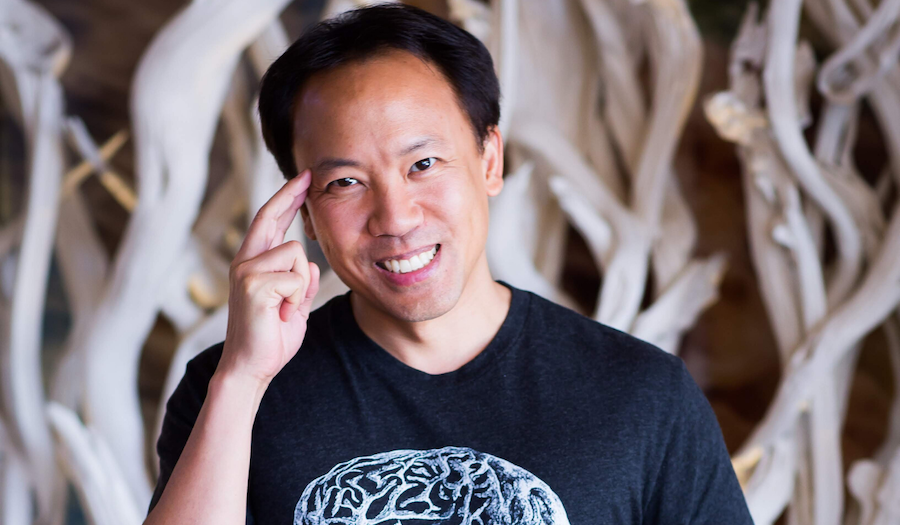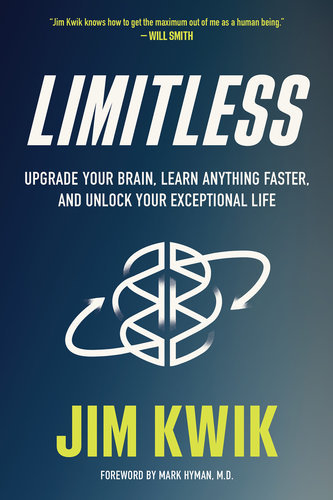Want to Upgrade Your Brain? Tips on How to Improve Your Mental Capacity

Below are excerpts from “Limitless – Upgrade Your Brain, Learn Anything Faster, Unlock Your Exceptional Life.” selected for The Sunday Paper by author Jim Kwik
When is the last time you had to remember someone’s phone number? I’m dating myself here, but I’m part of a generation that, when you wanted to call your friend down the block, you needed to know their number. Can you still remember some of your best friends’ numbers from childhood? What about the number of the person you talk or text with every day?
Neuroscientist Manfred Spitzer uses the term digital dementia to describe how the overuse of digital technology results in the breakdown of cognitive abilities. He argues that short-term memory pathways will start to deteriorate from underuse if we overuse technology. It’s the same with GPS. Move to a new city and see how quickly you become reliant on GPS to tell you how to get around. Then notice how long it takes you to map new roads in your mind—probably much longer than when you were younger, but not because your brain isn’t working as well. With tools like GPS, we don’t give our minds the chance to work. We rely on technology to do the memorization for us.
This reliance may be hurting our long-term memory. Maria Wimber of the University of Birmingham told the BBC that the trend of looking up information prevents the build-up of long- term memories. In a study that examined the memory habits of 6,000 adults in the UK, France, Germany, Italy, Spain, Belgium, the Netherlands, and Luxembourg, Wimber and her team found that more than a third of respondents turned to their computer first to retrieve information.
Why is this a big deal? Because such instant information can be easily and immediately forgotten. “Our brain appears to strengthen a memory each time we recall it, and at the same time forget irrelevant memories that are distracting us,” said Dr. Wimber. Forcing yourself to recall information instead of relying on an outside source to supply it for you is a way of creating and strengthening a permanent memory. When you contrast that with the reality that most of us have a habit of constantly looking up information—maybe even the same information—without bothering to try to remember it, it seems we’re doing ourselves harm.
Is relying on technology always bad? Many researchers disagree. The argument goes that by outsourcing some menial tasks like memorizing phone numbers or doing basic math or getting directions to a restaurant we’ve visited before, we’re saving brain space for something that matters more to us. There’s research that says our brains are more like a muscle, rather than a hard drive that fills up. That the more you use it, the stronger it gets, and the more it can store.
Too often, we outsource our brains to our smart devices, and our smart devices are making us, well, a little bit “stupid.” Our brains are the ultimate adaptation machines, capable of seemingly endless levels of evolution. And yet we often forget to give it the exercise it needs. Just as there is a physical price to always relying on the technology of the elevator instead of taking the stairs, so is there a price for lazy mental muscles. Use it or lose it.
————
Memory is arguably the most important part of the learning process. If you could not remember, then you could not learn anything. There is no knowledge without memory. But why do most people have less-than-ideal memory skills? I think it’s because of the way we were taught to memorize things, which was usually through rote memorization. To this day, most schools teach students to memorize by repeating a fact or a quote until it is temporarily burned in, even though people tend to forget this information as soon as they no longer need it and this type of memory rarely leads to mastery of the material being memorized.
Your memory is also one of your greatest assets. It supports you in every area of your life. I challenge you to do anything without utilizing your memory. If you did not have a memory, life would be extremely challenging, to say the least. Imagine waking up each day and forgetting everything you ever knew. You would have to teach yourself how to get out of bed, how to get dressed, how to brush your teeth, how to eat your breakfast, and how to drive a car. That would be quite inconvenient. Luckily you were born with a great memory; you just need to be shown how to use it.
If you’re going to perform a major upgrade on your brain, you’re going to want to unlimit your memory, as memory is such a fundamental part of most brain function. Since that’s the case, let me reassure you with a very important fact: There’s no such thing as a good memory or a bad memory; there is only a trained memory and an untrained memory.
————
We’re going to discuss some tools and techniques designed to train your memory. You will be applying basic principles of the mind and developing your memory in such a way that will make learning (remembering) more natural, easy, and fun. The most fundamental of these, though, is this: always remember MOM, a mnemonic device I created to kick up your memory instantly:
- M is for Motivation: The simple fact is that we are considerably more likely to remember things that we are motivated to remember. If someone says to you, “Hey, remember our call tomorrow,” you may or may not remember that you’ve scheduled a call with that person. If instead he says, “Hey, if you remember our call tomorrow, I’ll give you $5,000,” you will definitely remember that you’ve scheduled the call. You are overwhelmingly more likely to remember something when you have a strong motivation to do so. So, if you want to train yourself to have a stronger memory, give yourself a stronger motivation to do so. Reasons reap results, so make remembering personal. If you can convince yourself that there’s value in retaining memory, there’s a good chance that you will.
- O is for Observation: How often do you forget someone’s name as soon as you hear it? The reason is likely that you weren’t entirely paying attention when you heard that name. Maybe you were looking around the room to see who else you knew. Maybe you were still thinking about a conversation you’d just had. For whatever reason, you weren’t entirely present. Most of the time, when we fail to remember something, the issue isn’t retention but rather attention. If you’re serious about boosting your memory, condition yourself to be truly present in any situation where you want to remember something.
- M is for Methods: I’m going to provide you with a set of tools that you’ll be able to use when you want to remember something. Make sure you’re always carrying these around in your mental toolkit, and be sure to employ them to the point where they become second nature.
Association
One of the keys to memory and all of learning: In order to learn any new piece of information, it must be associated with something you already know.
This is worth repeating. To remember any new piece of information, you must associate it with something you already know. You have done this all your life; you just might not have been aware of it. Here’s a simple test. What comes to your mind when you think of a cherry? Perhaps red, sweet, fruit, pie, round, seeds, etc. These are words and pictures that you have learned to link to a cherry. You associated something you knew to something you did not know. You use association to ride a bike, eat your food, have a conversation, and to learn to do anything. In the same way, by making a story out of the words on your list, you associated them consciously, for easier recall. Your mind is constantly making countless associations every minute, most of them without your conscious awareness. This is how you learn. Do you have a song that reminds you of a special person? That memory is an association. Do you have a smell that reminds you of a time in your childhood? That memory is an association.
Emotion
Adding emotion makes something memorable. Information by itself is forgettable, but information combined with emotion be- comes a long-term memory. When we add emotions to something, we make it adventurous, we make it action-filled, we make it humorous, and we’re much more likely to remember it.

For more tips and techniques, visit limitlessbook.com where you’ll find the book and bonus gifts for ordering. I can’t wait to go on this journey with you.
This excerpt was featured in the May 3rd edition of The Sunday Paper. The Sunday Paper inspires hearts and minds to rise above the noise. To get The Sunday Paper delivered to your inbox each Sunday morning for free, click here to subscribe.
